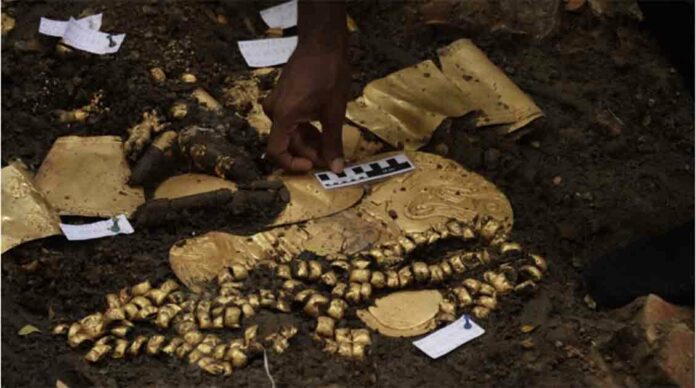For gold lovers and enthusiasts of ancient history, the recent archaeological find in Panama’s El Caño region is a true treasure trove. Archaeologists have unearthed the tomb of an esteemed pre-Hispanic Coclé lord, brimming with a spectacular array of golden artifacts. This remarkable discovery marks a pivotal moment in our understanding of the region’s captivating past, shedding light on the sophisticated burial practices and societal structures of this long-forgotten era.
The Uncovering of Tomb No. 9
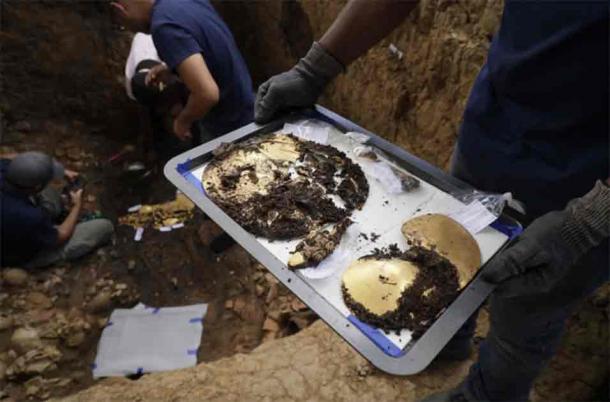
The excavation, identified as Tomb No. 9, is part of a comprehensive archaeological project led by the El Caño Foundation in collaboration with Panama’s Ministry of Culture (MiCultura). This initiative, funded through the “Cultural Cooperation Agreement No. 025-2021,” is a long-term effort aimed at preserving and unveiling the cultural heritage of the El Caño Archaeological Park, located in the district of Natá, province of Coclé.
According to Linette Montenegro, the national director of Heritage at MiCultura, the significance of this find lies not only in the presence of ceramics and gold artifacts, which are crucial to understanding the funerary customs of the time, but also in the “incalculable historical and cultural value” these items hold. The unearthed treasures include five pectoral plates, gold bead belts, bracelets, and earrings shaped like human figures, among other precious items.
Insights into a Forgotten World
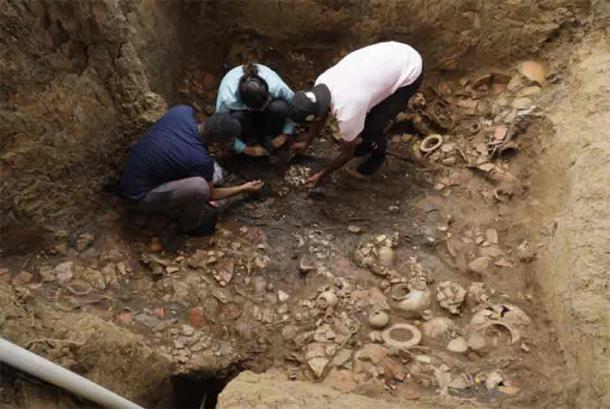
Dr. Julia Mayo, the director of the El Caño Foundation and a long-standing overseer of the archaeological project, suggests that the grand tomb belonged to a high-status male from the Rio Grande chiefdom, dating back to around 750 AD. This revelation provides deeper insight into the societal structures and burial practices of the era.
The practice of burying individuals face down, as observed with the prominent lord in this case, is noted as a customary burial method in this society. Dr. Mayo also brought to light that the burial site contained multiple individuals, suggesting a form of sacrificial rite or a tradition of burying servants or companions with the deceased.
El Caño: A Necropolis Unveiled
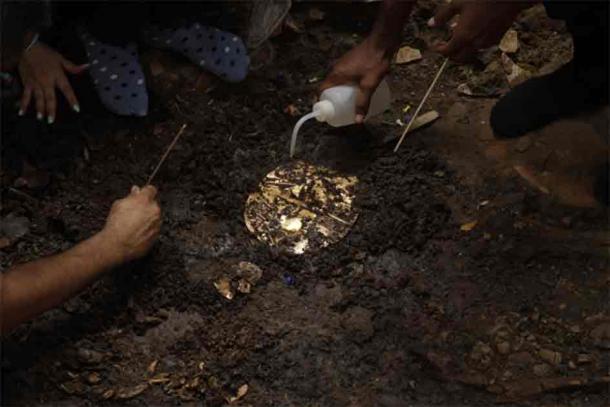
The El Caño site, which served as a necropolis or ‘city of the dead,’ has revealed complex cultural practices dating back to around 700 AD. This recent discovery sheds more light on the unique burial traditions, such as multiple and simultaneous burials, where high-status individuals were interred alongside others, possibly sacrificed to accompany them in the afterlife. Over the years, El Caño has revealed several pre-Columbian burial grounds believed to date from 700 to 1000 AD, providing valuable insights into the hierarchical chiefdom-based societies of Central America prior to European contact.
The site first came to light in 1925 through the efforts of American adventurer Hyatt Verrill. However, it wasn’t until the 1970s, spurred by accounts of the Spanish Conquistadors and their encounters with the gold-adorned elites of local societies, that formal archaeological interest in El Caño materialized. These initial investigations yielded few significant findings, and the project was halted by political changes in Panama, leading to decades of neglect.
Revival and Groundbreaking Discoveries
Interest in El Caño revived in the 1990s following political shifts in Panama. Archaeologist Julia Mayo, building on earlier works and employing modern surveying techniques, led a resurgence in excavation efforts. Her team’s work from 2005 onwards, particularly with the use of transient electromagnetics, uncovered burial sites of high cultural significance, identifying a significant area of pre-Columbian burials among stone monoliths.
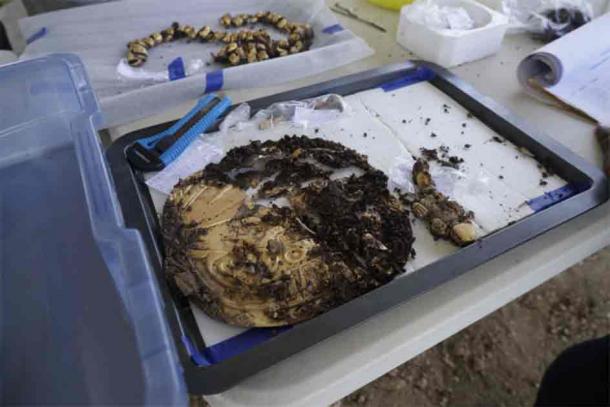
In 2008, Mayo’s team discovered the grave of a high-status warrior adorned in gold, marking a major find for the site. The excavation gained further momentum in 2011 with significant governmental and international support, leading to the discovery of a warrior chief and a complex burial site featuring 25 arranged bodies.
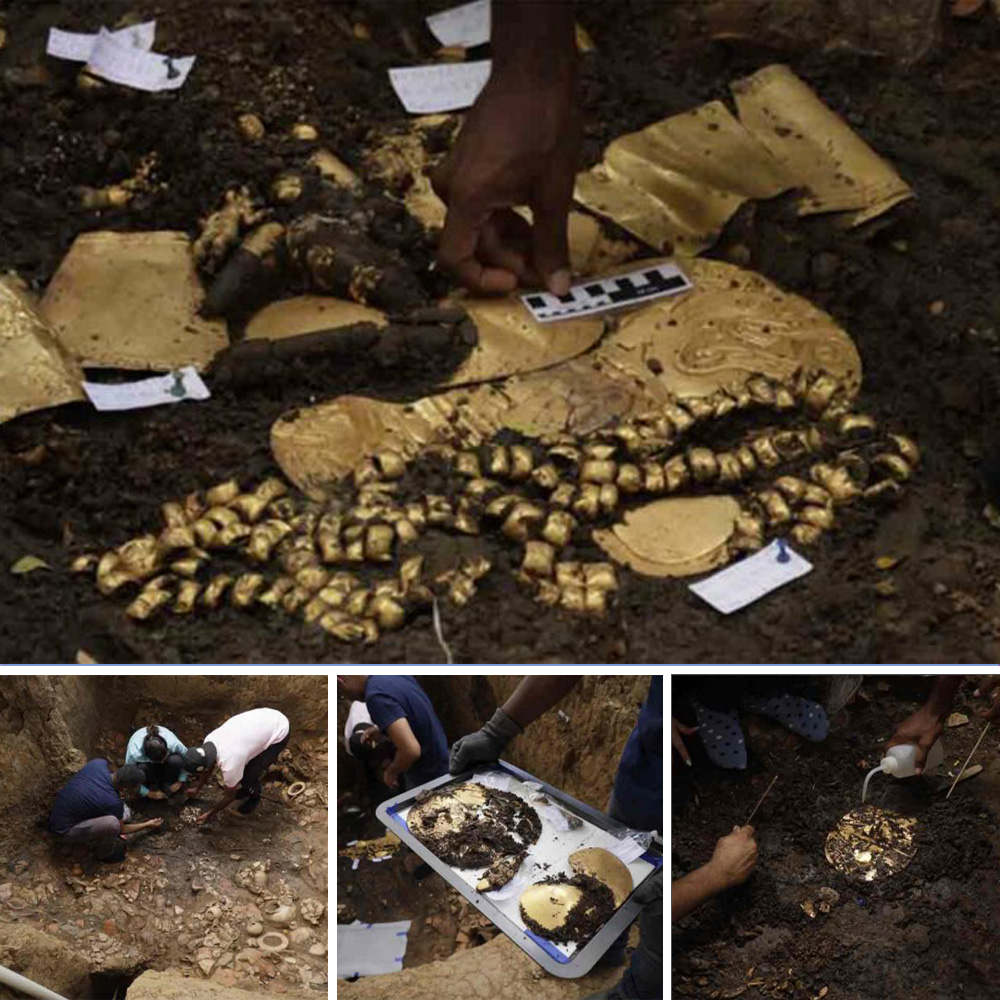
The latest find at El Caño, with its opulent tomb of a pre-Hispanic lord, showcases the extraordinary potential of this archaeological site. It stands as a shining example of Panama’s rich pre-Columbian history, its archaeological significance, and its capacity to draw interest from around the world. As the excavation continues, the full historical richness of El Caño is yet to be uncovered, promising even more captivating insights into the intertwined nature of historical discovery and modern community benefit.
